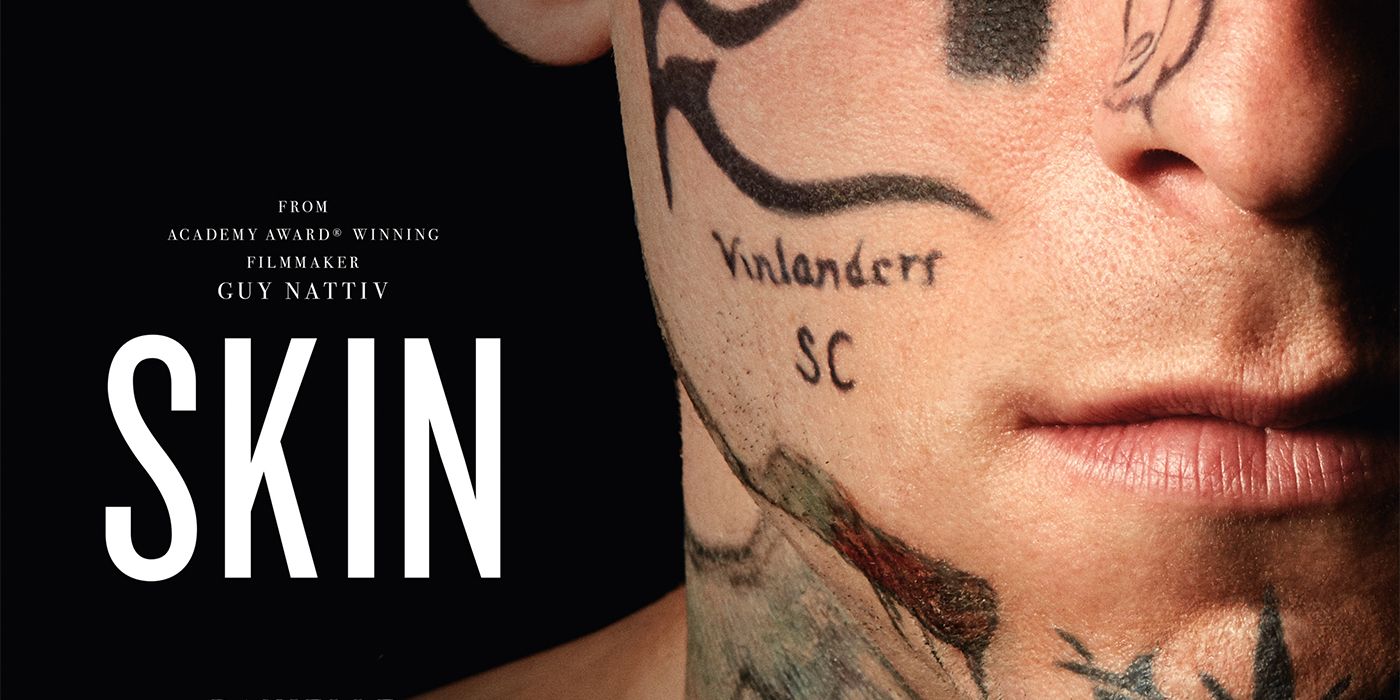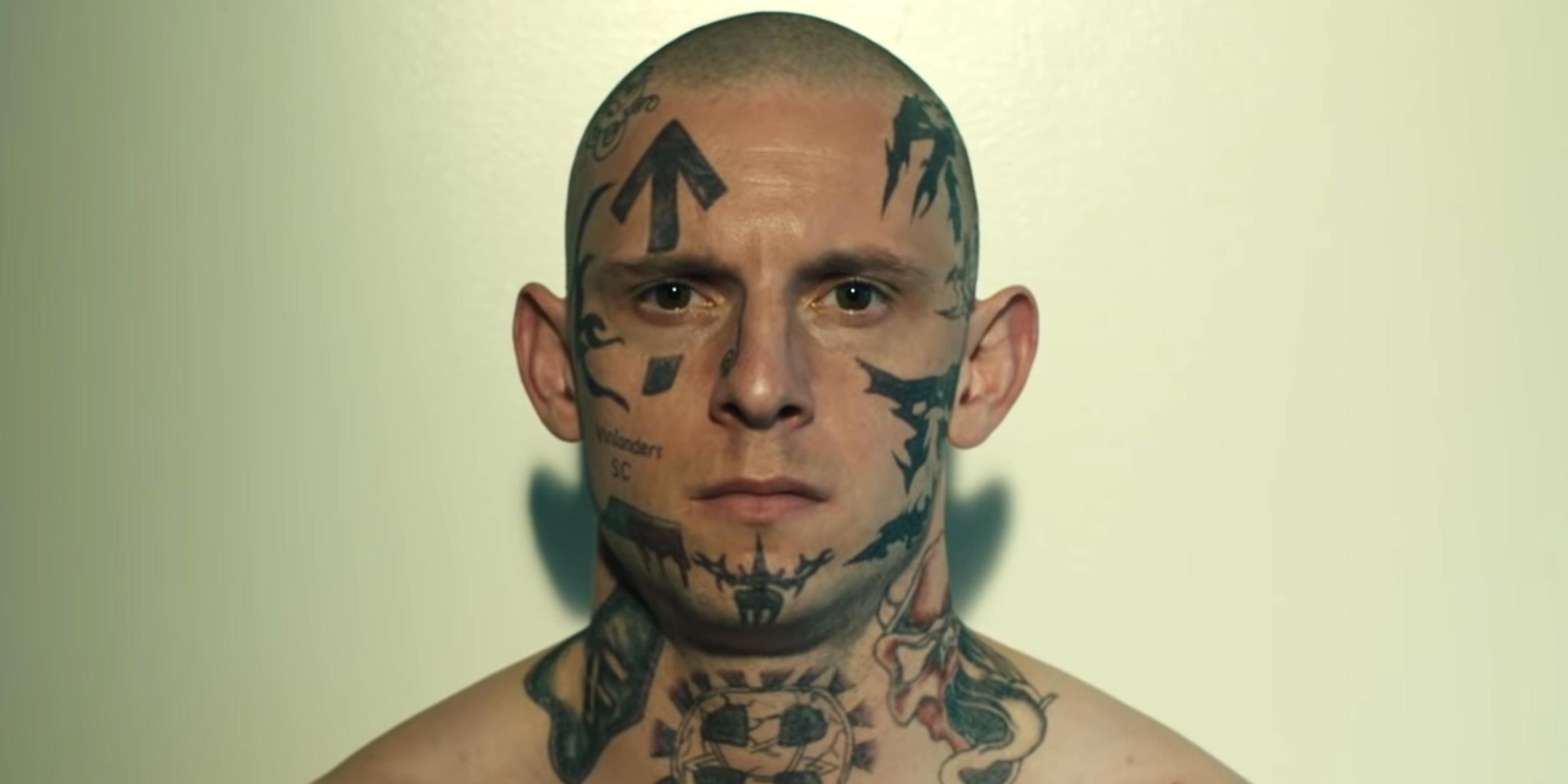Skin, the biographical story of Bryon Widner (Jamie Bell) and his departure from the toxic white supremacist movement that controlled his life, will see a limited release this week. The film is being distributed by A24, which has been responsible for independent hits such as the award-winning Moonlight and more recently Midsommar. Skin follows in its predecessors footsteps by being a deeply personal story of self-discovery, only this time it's about a real person contending with the racism that permeates the United States even today. Actress Danielle Macdonald, who plays Bryon's wife Julie, shared her filming experience with Screen Rant and discussed the message that director Guy Nattiv hope to spread.
How did you first become involved with Guy Nattiv and with the Skin project?
Danielle Macdonald: I met Guy through a friend, actually. My best friend is friends with Guy’s wife. He would look after their dog when they go out of town, so I met his dog before I met him. One day when he was giving it back, I was with him and I met Guy for the first time. So I met him in a super random social setting, not anything to do with film. I did know he was a writer and director, but I didn’t really know anything much about him. Then Patticakes came out at Sundance, and he asked me if he could send me a short that he would like for me to be involved in. I read the short and immediately said yes. I mean, I hadn’t even seen any of his work, but I said, “This is the best thing I’ve ever read.” I wish I could write that well. So it was really cool, and I jumped onboard immediately.
How much research did you do on Julie? Were you able to meet her and her family the way Jamie did Bryon?
Danielle Macdonald: I didn’t get to meet Julie, but I did get to meet Bryon. Jamie got to go and meet Bryon, and hang out with him for a few days. I got to meet Bryon before we started shooting, but I didn’t get to meet Julie or the kids unfortunately. Privacy and everything, so it’s understandable. But Guy and Jamie Reyes, Guy’s wife, have known Bryon and Julie for seven years or something like that. They knew so much about them, so they were such a good source of information about Julie. And then, of course, Jamie Bell.
It got really confusing on set. I’d be like, “Where’s Jamie? I mean, the other Jamie.” Just like how there’s two Skins. I’m like, “Wow, you guys really like to make this confusing for us.”
What is it that draws you most to the character of Julie? What do you find most relatable and most alienating about her story?
Danielle Macdonald: Alienating is the easy one to jump to, because of obviously her world. This kind of universe, this understanding and acceptance of him when he’s in the movement – that was so alienating to me. How can you fall in love with someone that’s in a world that you are trying to escape? But that’s why I had to do a lot of research, because I had to understand that I couldn’t judge her choices without understanding them. So I did the research and understood that she was born into a family that was in the movement. Her dad got out of the movement, so that’s how she was in and out of it her whole life. But that’s how she couldn’t quite escape it, because it was all she knew and all she grew up with. Then her boyfriends had been in the movement, and it is very hard to escape a life when you don’t know anyone outside of that life.
I understand how she could fall for someone like him, because she also saw a goodness in him. Clearly he wanted to get out as well, and she gave him the strength to do it. I think together, they were able to completely get out of it. Before I think she was always half in and out, because she was like, “How do I survive if these are the only people giving me opportunities?” It made me understand how she was still somewhat involved in that life, even though she didn’t want to be. Then the part that I completely understood and related to was the love that she had for her children. I don’t have kids, so that was a new thing for me, but I understand love for family. And that was the driving force, she wanted something better for them. That’s how I got into her, for sure.
That’s one of the driving forces in the film, too, that both Julie and Bryon want to do better for these kids. On that note, how did you relate to the child actors behind the scenes?
Danielle Macdonald: It was really great. Jamie made sure that he was never scary Jamie around them, if that makes sense. He also made sure he was never scary Jamie around me, actually. He always said, “You have to fall in love with me. Let’s not make this harder.” It was kind of funny; he would do this thing. He has fake teeth in the movie, but he would never take them out in front of me. So we had little things like that, which was cool.
But with the kids, I definitely got to know them anytime Jamie was filming his scary Jamie stuff. We kept the language pretty light, which I think was good. I would hang out with the kids at the hotel; we were all staying in one place, which was really helpful because it meant hanging out at night. There was a little games area, and I could play games with them, chat with them and get to know them. It really helped, because once we get on set they’re really comfortable with me. It’s easier for them to dive into it. It totally feels like a family, and I got really protective. There’s a rally, and there’s hateful things coming out of people’s mouths, and I have a little girl standing in front of me. I just had my hands clamped over her ears, thinking, “You will hear none of this. I will not let it happen.” And that is not in the script, that is me.
One thing I loved about Skin was that, despite the despicable nature and activities of the movement, Guy didn’t showcase much of the violence against minorities. None of the violence we did see felt gratuitous, and most of it was what the group inflicted on each other. Was that a conscious choice, and if so, what message was it sending?
Danielle Macdonald: I think that was a huge thing, and one of the first things we explored with Jamie’s character was self-hatred. His drinking every day was the only way he could cope with what he was doing. He was blacking it out because he couldn’t live with himself. So that inner hate was the immediate focus of how he was actually able to be there at all. What these hate groups represent is obviously hated towards others, but there is such a volatile violence within them, and a dominance that you see. The way that Pa treats everyone, you know that he has this control and this command. And how sexual Ma is with these kids, you understand this control that they have. It’s wrong and it’s unhealthy, but you can see how these kids when they’re young don’t know how else to get out. They don’t know how to escape, they’re just learning the same things. I think that was the focus, because we had to understand how someone gets into this life to accept the fact that they can get out.
Unfortunately, a film like Skin is relevant not just in the United States, but all over the world where we’re seeing the return of white supremacist movements and the curtailing of minority rights. So what are you hoping audiences take away from this movie?
Danielle Macdonald: I just hope it starts a conversation, honestly. The main reason I signed onto that film was because I asked myself the question: how can we make a change? How can society change? Because these people exist, and they’re just getting louder. They really are, for some reason they seem to have even more of a voice now. And that is terrifying. The answer I kept coming back to was for people to change, because that is the only way. We have to educate kids differently, so they don’t grow up just following.
This man changed his life and now his four kids are going to have a different life because of it, and that is important to me. If we don’t allow people to change, how can we expect society to change? That’s the question I ask myself, because I find it very difficult. Can this kind of person be forgiven? It’s a very tough question, and I don’t think there’s a right answer. I don’t think people will have the same answer when they watch this movie, but if it at least gets them talking and questioning and asking what can we do, then that is important.
Lastly, what’s next for you? What projects can we look forward to?
Danielle Macdonald: I have a few things coming up. Obviously, Skin is coming out [this week], which is exciting. I have a series on Netflix called Unbelievable, which is coming out in the Fall. And then I had a film called Paradise Hills, which premiered at Sundance and is coming in November.
Skin premieres in select theaters on July 26th.


